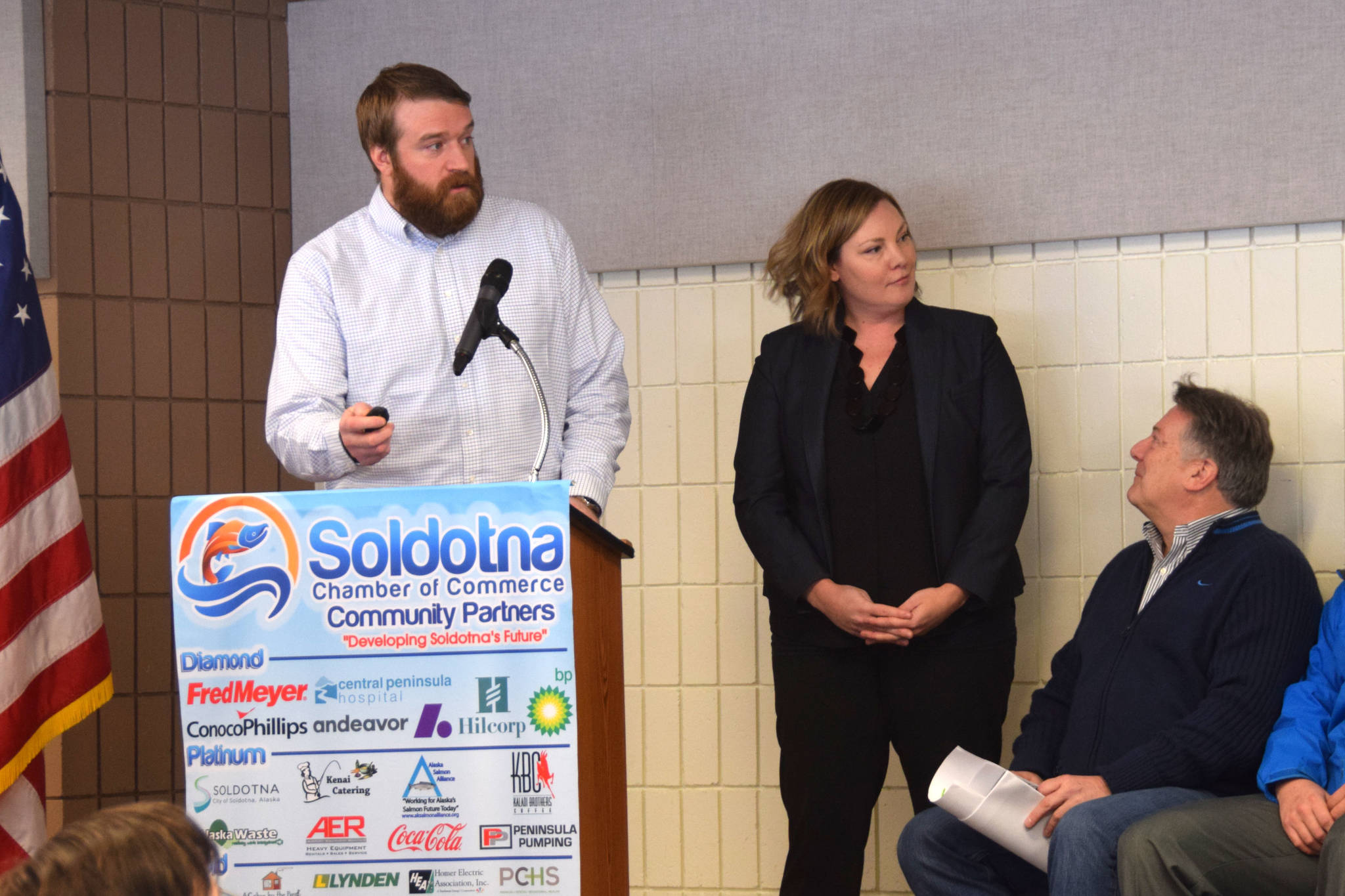The fate of the Soldotna Field House and the upcoming special election were discussed at length during Soldotna’s Chamber Luncheon on Wednesday. Soldotna City Manager Stephanie Queen, Public Works Director Kyle Kornelis and Tim Dillon with the Kenai Peninsula Economic Development Division gave a presentation to the chamber laying out the details of the project’s design and explaining how the city plans to pay for its construction and upkeep.
The field house has been in the planning phases for two years now as a coordinated effort between city officials, youth and adult sports leagues and medical professionals. During the presentation, Kornelis gave a breakdown of what the facility will look like and what features it will have. According to specifications laid out in the presentation, the bottom floor of the building will be 42,000 square feet with a second-floor mezzanine that totals 15,000 square feet. The mezzanine will feature a three-lane running track and have elevator access.
The bottom floor of the facility will have Sport Court flooring for sports such as basketball or volleyball, as well as removable turf for soccer or football. It would also include dividers that can allow multiple events to occur simultaneously. The complex will meet size regulations for all sports except high school football and soccer, giving Soldotna the opportunity to host various state tournaments in the future. The field house will be built adjacent to the Soldotna Regional Sports Complex, and the two buildings will be connected with a breezeway.
Kornelis said that the field house design is “95 percent complete,” and the planners are waiting on the results of a special election on March 5 before finalizing anything. If the vote passes, Kornelis said that he expects construction to start as early as this summer, with the building being complete by August of 2020.
The special election will involve Soldotna residents and concerns the issuance of a general bond of $10 million to fund the project, which is estimated to cost $11.8 million total. Queen said during the presentation that this bond is the most effective way to pay for the project because the interest rate they expect to pay on the bond will be relatively low. “We think we can get something south of 4 percent (interest), maybe 3.5 to 3.9 percent,” Queen said while going over the financial details of the project.
The issuance of the bond would include implementing a .5 percent sales tax, making the city’s total sales tax 3.5 percent for the next 10 years. The additional .5 percent would sunset immediately after the bond is repaid in full according to the language of the proposed ordinance.
Some people opposed to the project have expressed their concern about the vote only being open to Soldotna residents even though sales tax will affect anyone on the peninsula who shops in Soldotna. Others have wondered if the facility will pay for itself once completed or if the operational costs will be an additional burden on the city’s finances.
The election is only for Soldotna voters because the city of Soldotna will be taking on the obligation of paying off the bond. Queen said that a sales tax makes the most sense for financing the project because the field house would benefit people all over the peninsula, not just Soldotna residents. Queen explained that about 65 percent of the whole borough population lives within a 45-minute drive of the field house’s potential location, meaning it would be a facility that people from all over the peninsula can utilize.
Queen also explained the day-to-day impact that the sales tax increase would have on peninsula residents using several real-life examples. A cup of coffee that costs $5.25 would see a $0.03 price increase, while a family that spends $300 per month on groceries would be spending an additional $1.50. The sales tax rate has a cap on purchases of $500, meaning the maximum sales tax increase on any individual purchase would be $2.50.
In terms of the facility paying for itself after construction, the presenters said that it most likely will not. Queen said that after making a “business plan” for the field house, reasonable estimates show a revenue of about $300,000 a year. This leaves around $50,000 in expenses that Queen said could be included in the city’s normal annual budget without implementing additional taxes.
“Many of the services the city provides do not (pay for themselves),” said Queen. “It’s up to us to decide as a community whether this facility is something that’s important to us.”
During the presentation, Dillon touched on the non-financial impacts that the field house could have on the community.
“We all know that idle hands are the devil’s tools,” said Dillon. “Giving people an opportunity to do something else during the winter months is key.” Dillon emphasized the impact on quality of life that the field house would have by bringing the community together for special events and keeping people active even when cold weather limits the outdoor activities available.
The special election for approving the issuance of the bond and the implementation of the sales tax is on Tuesday, March 5. Polls will be open from 7 a.m. to 8 p.m. and Soldotna residents can go to Soldotna City Hall on Election Day or request an absentee ballot by Feb. 26 to cast their vote.
• Contact Brian Mazurek at bmazurek@soundpublishing.com

